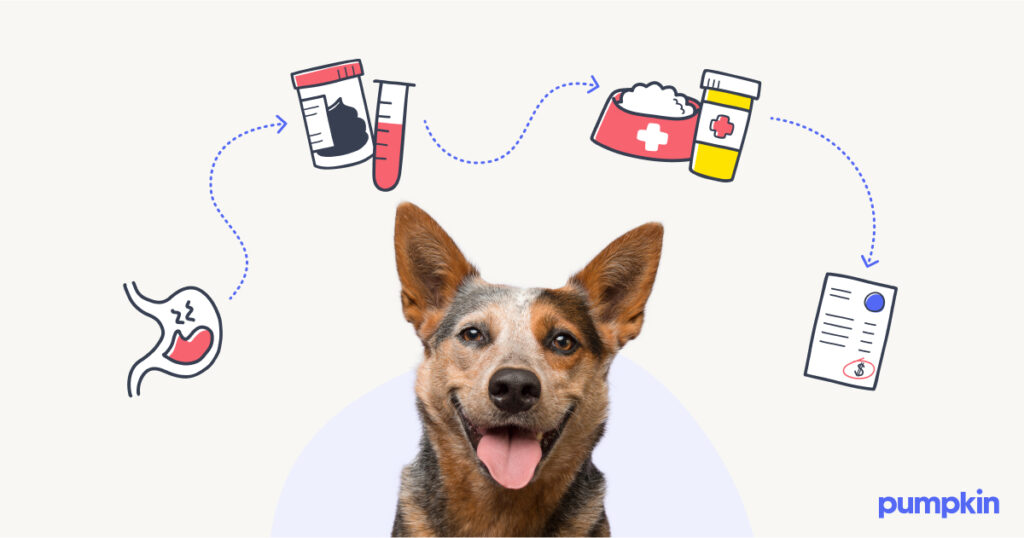- Pumpkin Team
- Jun 30, 2025
- 5 min read
Updated: Oct 30, 2025
Key Points
Among Pumpkin pet parents, the average cost of a routine vet visit for a dog is $229; for cats, the average cost is slightly lower at $197.
Preventative treatments like vaccines, dental care, and parasite prevention do come with up-front costs, but they can save you money over time.
While pet insurance typically doesn’t cover routine wellness care, pet health and wellness plans can help you save hundreds of dollars a year on eligible vet bills.
As a responsible dog owner, you know the pet parent's life isn’t all dinnertime, zoomies, and cuddles on the couch. You also need to stay on top of grooming, training, and regular vet visits — and those vet appointments can be pricey. That’s especially true if you have multiple pets.
To get your pet the care they need, you’ll want to be prepared financially. So, what’s the average cost of routine vet care for dogs and cats?
In this guide, we’ll break down the average cost of vet visits. We’ll also cover the typical costs of preventative treatment, including dental cleaning, bloodwork, and spaying/neutering.
How much does an average vet visit cost?
When you take your pet to the veterinarian, the price will depend on your location, the type of service, the specific vet, and your pet’s health needs. Of course, you can always ask for an estimate when you’re making your appointment.
For preventative and routine wellness care, the average vet bill for dogs costs $229. For cats, the average vet bill is $197.¹ This data is based on claims filed by Pumpkin customers between February 2022 and February 2025. Again, the cost of vet care will vary based on your location, your pet’s species, and their health needs. You may be able to find low-cost veterinary clinics in your area, so if you’re worried about costs, talk to your veterinarian and other pet parents for advice.
Being a responsible pet parent isn’t cheap, but there are ways to get help. Over a dog’s lifetime, pet parents will spend an average of about $16,100 on vet care.² That’s why every pet with a Pumpkin Dog Insurance plan has the option of getting 90% cash back on covered vet bills.
Don’t forget: A typical pet insurance policy won’t cover routine vet care, so consider adding on a wellness plan. For instance, with the Pumpkin Wellness Club, pet parents can save up to $460 each year on routine treatments such as annual checkups, vaccinations, dental cleanings, and heartworm prevention.
How much do preventative treatments cost?
Preventative care can be key to keeping your dog happy and healthy. By taking them to the vet regularly and keeping their vaccines up to date, you can reduce the risk of serious illness or disease. Not only will this keep your pet healthy, but it can help you avoid expensive treatments in the long run.
Of course, this comes with a cost, but how much should you expect to pay? Here’s a rundown of some of the most common preventive treatments for pets:

Vaccines
Puppies should follow the core vaccine schedule with ongoing booster shots. The core vaccines include the combined distemper, Hepatitis, parvovirus, and parainfluenza (DHPP) vaccines, plus Rabies and Leptospirosis.
You may also choose optional vaccines such as influenza and Bordetella.
The average price varies depending on the vaccine type and your location. A single vaccine for dogs ranges in price from $15 to $50. Your vet may also charge you a single, combined fee for all of their vaccinations. In some cases, your vet may also include the cost of an examination, deworming, or other preventive care.
The average price of a cat vaccine is slightly less, ranging from $10 to $45. The kitten vaccine schedule starts around 6–8 weeks of age with the Feline Viral Rhinotracheitis, Calicivirus, and Panleukopenia (FVRCP) vaccine.
Dental cleaning
Dental care should be a priority for pet owners. Without proper oral hygiene, your dog may end up with periodontal disease, with symptoms such as broken teeth, cysts, bad breath, and tumors.
The price for a dental check and cleaning can range from $113 to $750.
You can support your dog’s oral health with regular brushing and dental checkups at the vet. The cost depends on the complexity of the exam, and whether procedures such as cleaning, sedation, or extraction are required.
Tick/flea prevention
Parasites such as fleas and ticks can cause a range of health issues. From itchy skin to tick-borne diseases, it’s not an issue pet owners can afford to ignore. Ask your vet about tick and flea prevention, and expect to pay between $22 and $27 per month.
Deworming
It doesn’t take much for a dog to become infected with hookworms, ringworms, or intestinal parasites. Some of these infections can even spread to humans, so it is important to prevent the spread. The average cost of deworming medication is between $50 and $150.
Puppies are at the highest risk, so vets recommend you start deworming treatment at 6-8 weeks of age. Your vet may also check your dog’s stools twice a year.
Bloodwork
Vets can take blood tests during routine visits, even if they don’t suspect any serious illness. These blood tests can flag any issues and give you an insight into your pup’s overall health.
The average price for bloodwork is $80 to $200. Blood tests may also be performed if your pet needs emergency treatment.
Spaying/neutering
Spaying/neutering can improve your dog’s life expectancy and reduce the risk of certain cancers. This procedure can also decrease incidences of marking and other unwanted behaviors.
This is a one-off expense, with an average price tag between $160 and $220. The right time to get your dog spayed/neutered is between 5 and 15 months old, depending on their size and gender.
Pet insurance won’t cover spay and neuter procedures, but that doesn’t mean you can’t get help paying for them. Members of the Pumpkin Wellness Club can save up to $460 a year on routine and preventive care, including spay and neuter surgery.
How can pet insurance help with vet costs?

Standard pet insurance covers unexpected accidents and illnesses that affect your pet. Typically, your pet insurance plan won’t cover annual checkups, preventive care, or pre-existing conditions.
Once you meet your deductible, pet insurance can help with costs for eligible vet bills such as:
Hospitalization
Prescription medications
Treatment for infectious diseases
Treatment for toxins and blockages
Emergency surgery
Diagnostic tests
Treatment for digestive issues
Behavioral issues
Cancer, tumors, and sudden growths
Skin problems and rashes
Gastrointestinal issues
So, how do you get help paying for preventative care such as vaccines and annual wellness visits? This is where services like the Pumpkin Wellness Club can be helpful. Depending on your plan, you can save up to $460 per year on vet care. You also get access to a 24/7 pet health hotline and discounts on top pet brands.
When paired with a traditional pet insurance policy, your dog will be covered for both eligible emergencies and routine vet care. Plus, you can visit your preferred vet as long as they are in the United States or Canada.
Be financially prepared
Remember, welcoming a dog or cat into your home is an ongoing financial commitment. Besides the initial cost of adoption, you will have to consider food, bedding, accessories, and toys.
During the first few months, your pet will have a few big vet expenses, too. Think vaccinations, spaying/neutering, and wellness checks.
Before welcoming a new pet into your home, make sure you can afford the care your new pet will need to stay happy and healthy throughout their life.
1Based on claims submitted between February 2022 and February 2025 by Pumpkin customers enrolled in the Pumpkin Preventative Essentials or Wellness plans.
2American Pets Product Association (APPA), “2021-2022 APPA National Pet Owners Survey.” Estimated lifetime cost for a dog living 12 years based on annual spend data from survey (12 years at $1,344 per year).
REFERENCES



